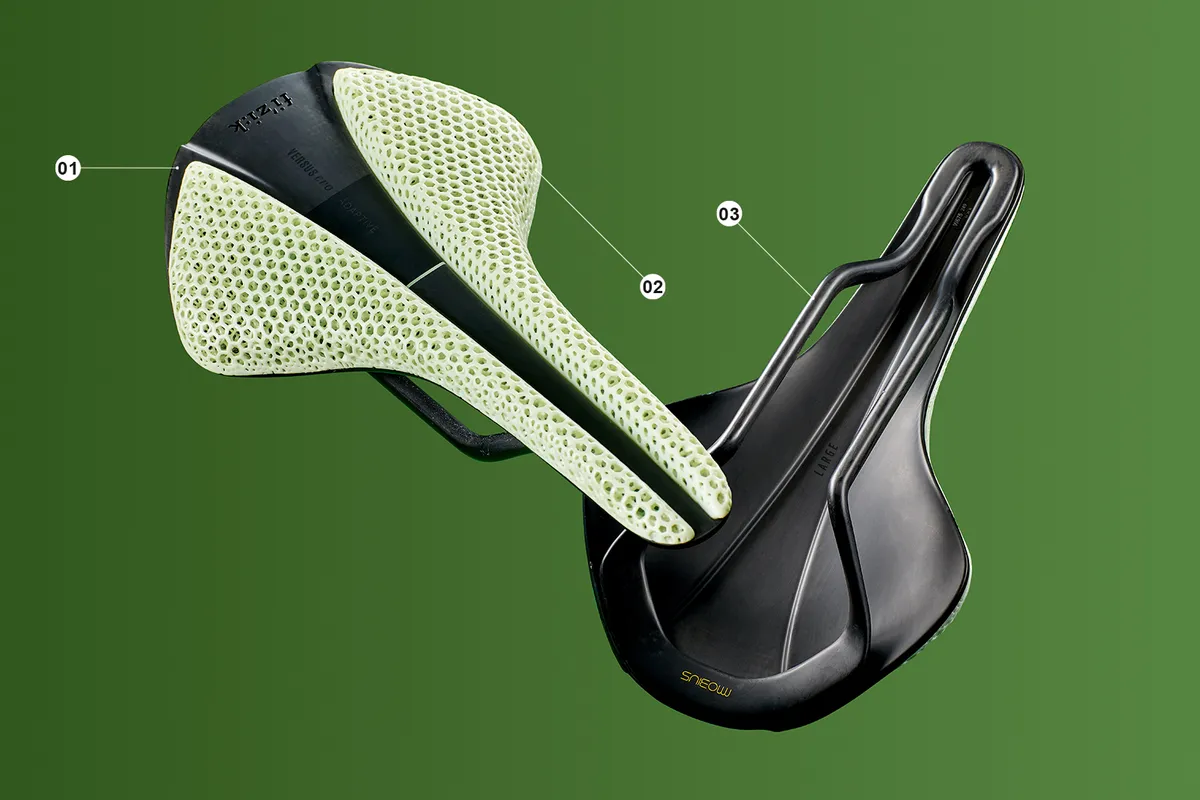Saddle technology has moved at quite a pace over recent years with more anatomical-based designs, often featuring pressure relief channels. One thing that hasn’t really changed, though, is the basic construction: a solid hull onto which is bonded a combination of padding (gel and/or foam) with a leather or PU cover.
The Adaptive, however, throws tradition out of the window and uses 3D printing technology to create a unique seat with padding that’s left uncovered. Fizik worked closely with Carbon 3D – an innovative company that produces 3D-printed polymers, most recently seen in Adidas’s flagship running shoes – to produce the Adaptive.
The Adaptive is based on Fizik’s ever popular Antares in its range-topping £324.99 Versus Evo 00 lightweight carbon form (the Antares Versus Evo range starts at £189.99). In fact, it uses the top-of-the-range carbon hull with its bonded one-piece Mobius rail as its base.
We first got to see the Adaptive as a late-stage prototype last year and we have to admit that we weren’t fully convinced it would ever come to market, however, this production version looks the same as the original concept we saw in 2019.
On the bike it is simply a wonderful place to sit. The transition in tensions and give through the saddle’s full length conforms perfectly to this tester’s hind quarters.
As part of the test I’ve used the Adaptive for a 60-mile gravel ride, an 80-mile road excursion and even tried it on an ebike and it’s proven itself to be a superbly comfortable perch.
Despite the fact that I wasn’t the greatest fan of the standard Antares (I prefer the new Vento short saddle and the classic Aliante) I’d have no issues running this saddle all of the time. I’d even go as far to say that this is the most comfortable padding I’ve tried in more than two decades of testing. It’s light too at just 160.6g (in the large version).
- Sizing: The Adaptive 00 measures up at 274mm in length and is available in two widths: a narrow 139mm and a 146mm version
- Upper: The upper is 3D printed, which allows Fizik to tune the cushioning seamlessly throughout and keep weight to a minimum
- Rails: Fizik’s Adaptive 00 is based on the brand’s ever-popular Versus Antares saddle and uses the same full carbon base and oversized carbon rails

It isn’t perfect, though. To start with it’s only available in one design, which could limit its appeal. The open 3D print has space-age looks and is incredibly comfortable with it, but I wouldn’t want to use it in extreme weather conditions – a run out on a dry gravel ride saw dust and dirt get into the matrix padding, even though it quickly cleared with a blast from the air compressor and a bit of jet washing. Nevertheless, I still wouldn’t want to run it through the winter.
Another, more obvious, issue is the price: £370 is jaw-droppingly expensive, but I can see that making a saddle this complex takes a lot of research and development, not to mention high manufacturing costs.
As proof of concept I have to admire the Adaptive, but the price for the 00 is eye-wateringly high. Thankfully, Fizik has recently launched two cheaper models: the R3 Adaptive at £249.99 (209g, Kium hollow rails) and the R1 Adaptive £299.99 (180g, carbon rails) and it will be one of those saddles where I will spend my money to experience this revolution in saddle comfort.
Product
| Brand | fizik |
| Price | 390.00 EUR,370.00 GBP,300.00 USD |
| Weight | 160.6000, GRAM (146mm) - |
Features
| br_cutOut | no |
| br_gender | mens |
| br_length | 274mm |
| br_availableWidths | 139, 146mm |
| Features | Rail: One-piece Mobius rail |
